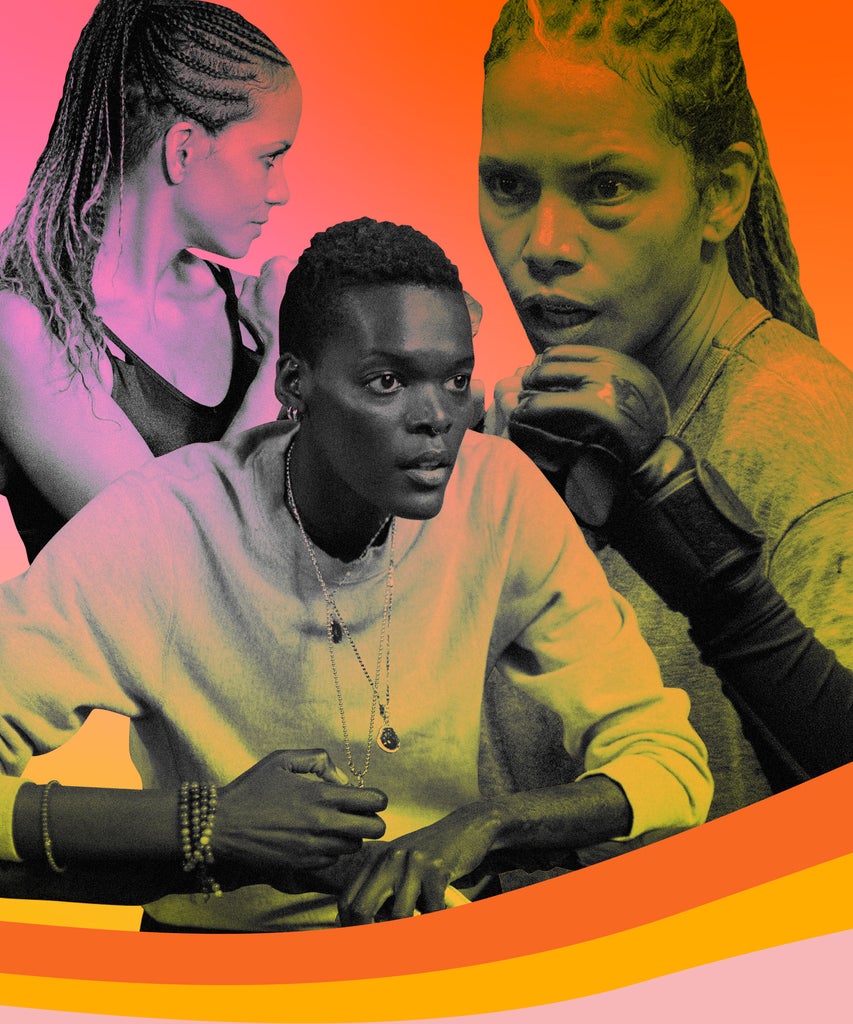Welcome to “What’s Good,” a column where we break down what’s soothing, distracting, or just plain good in the streaming world with a “rooting for everybody Black” energy.

What’s Good? Halle Berry’s directorial debut Bruised on Netflix plays out as a predictable inspirational sports drama packed with all the clichés we’re used to — a washed up fighter down on her luck; sweaty training montages; a complicated home life riddled with addiction — culminating in a big, punishing, career-on-the-line fight. The formulaic drama falters consistently, but Halle Berry’s gutting performance as former MMA star Jackie Justice and British actress Sheila Atim’s revelatory supporting turn as her trainer, Buddhakan, save the film from itself. It’s not a knockout, but under Berry’s direction, the two actresses deliver formidable punches throughout.
Who It’s Good For: If you’ve ever pretended to be Rocky Balboa or Adonis Creed while running up a flight of stairs with “Eye Of The Tiger” ringing in your ears, you’re probably familiar with boxing movies and their tropes. Bruised doesn’t deliver anything new to the genre but if you love watching a character dig deep to overcome their emotional demons for a physical triumph, the film succeeds at that, at the very least. It’s clear that an Academy-Award winning actor is at the helm because Bruised’s strongest emotional blows come from its cast.
Berry says she had to fight to get Bruised made, and especially to direct it herself, because she was struggling to find roles worthy of her talent. She is a 55-year-old Black woman in Hollywood afterall. And you can tell onscreen the work Berry put in offscreen. It’s not just that the physicality of the role leaves you in awe, it’s also that if you are a fan of the actress who feels like she has been a staple in Black Hollywood forever, it’s exhilarating to see her in such a formidable role. And because she’s HALLE BERRY, she elevates a weak script and uneven cinematography (also a testament to Berry still attempting to find her footing as a new director) to something watchable, and at times, riveting. The latter can be equally attributed to an enigmatic Atim, who plays the wise trainer archetype with impressive depth, finding layers in a character who could have easily been a prop used only to propel Justice’s story.
If you’ve been rooting for Berry since Boomerang, or if you love watching a breakthrough performance that we’ll look back on with the same reverence when Atim becomes an award-winning legend (yes, she’s that good) in her own right, Bruised is worth your time.
How Good Is It? If we’re grading Bruised on the scale of one to “it could have starred Blake Lively,” it probably deserves an Oscar. It’s not good enough for any awards love this year, but it is a very good at-home-and-bored Netflix watch. In a lesser actor’s hands, the movie’s flaws would have been overpowering, but with Berry and Atim playing off of each other with skill and subtlety, Bruised’s earnesty and oversentimentality hits you in the feels, and takes Bruised from another cliched sports movie to an actors’ showcase. Aside from Jackie Justice’s (Berry) abusive boyfriend and bad manager (Adan Canto) who is an insufferable character with no redeeming qualities and it doesn’t help that Canto overplays him in every scene, the rest of the cast is stellar.
Shamier Anderson is pitch perfect as a gaudily-dressed gym owner/ fight manager who wants to capitalise on Justice’s underdog story for money. Danny Boyd Jr. plays Justice’s estranged 6-year-old son Manny who comes back into her life unexpectedly when his father dies with heartbreaking restraint rare in a child actor. Adriane Lenox is magnetic and infuriating as Justice’s mess of a mother. And legendary stage and screen actor Stephen McKinley Henderson is underused as cornerman Pops but he steals every scene he’s in, as usual.
Bruised’s biggest scene-stealer is still Atim’s Buddhakan, who brings a quiet strength to her moments with Justice, and it’s in the silence where their relationship goes from trainer/ fighter or mentor/mentee to something more. Sure, a fighter falling in love with her trainer is another cliché (have I mentioned the movie has a lot of those?) but the way Atim and Berry lock into each other with palpable chemistry, and the way Atim elevates every familiar line that in another fighting film could fall flat (example: “You grew up with damage and survived on rage. And that rage carried you into the ring.”) make their relationship the heart of Bruised. As they both try to move past their devastating backstories (Buddhakan’s wife left her and took her son, Justice was sexually abused as a child and abandoned her own son), their healing is unfolding as vigourously as their training sequences, and as Justice gets her fight back, they each find solace in each other’s trauma. It’s a really grounded, beautiful love story between two Black women in the midst of a sloppy and chaotic film that doesn’t treat the rest of its plot with the same intention.
Ultimately, Bruised is good enough to remind everyone why Halle Berry is one of the best in the game, and she should have her pick of roles that challenge her and showcase her imitable talent. And despite its shaky direction, the film shows enough promise in Berry as a filmmaker that this shouldn’t be the last time we see her behind the lens. And Shelia Atim is a STAR — it’s time everyone across the pond recognised it.
Like what you see? How about some more R29 goodness, right here?
Halle Berry Debuted A Divisive New Haircut